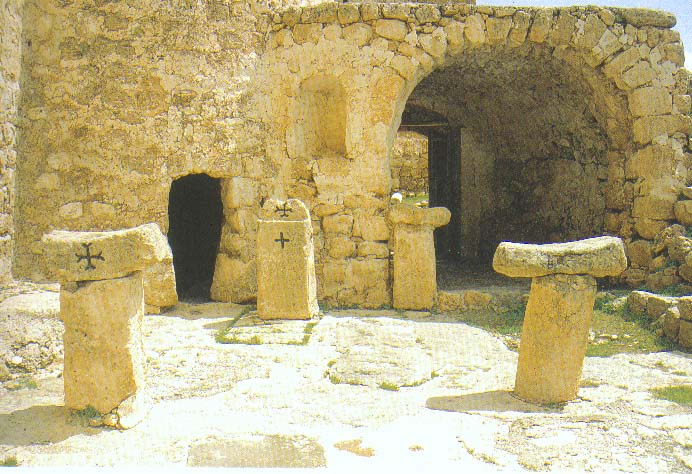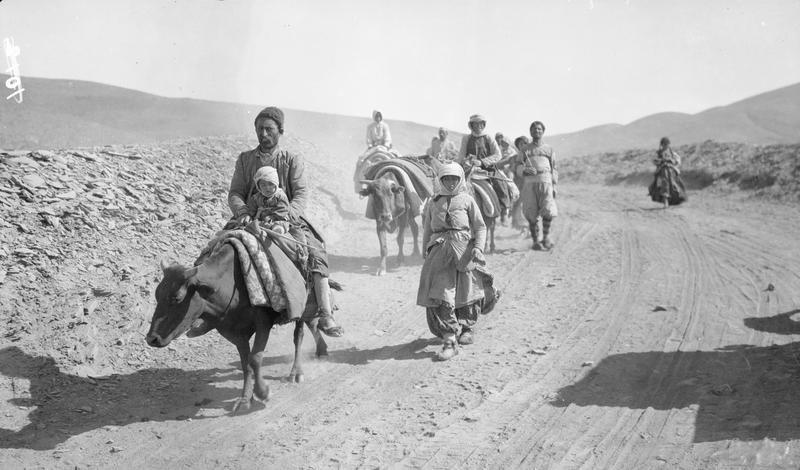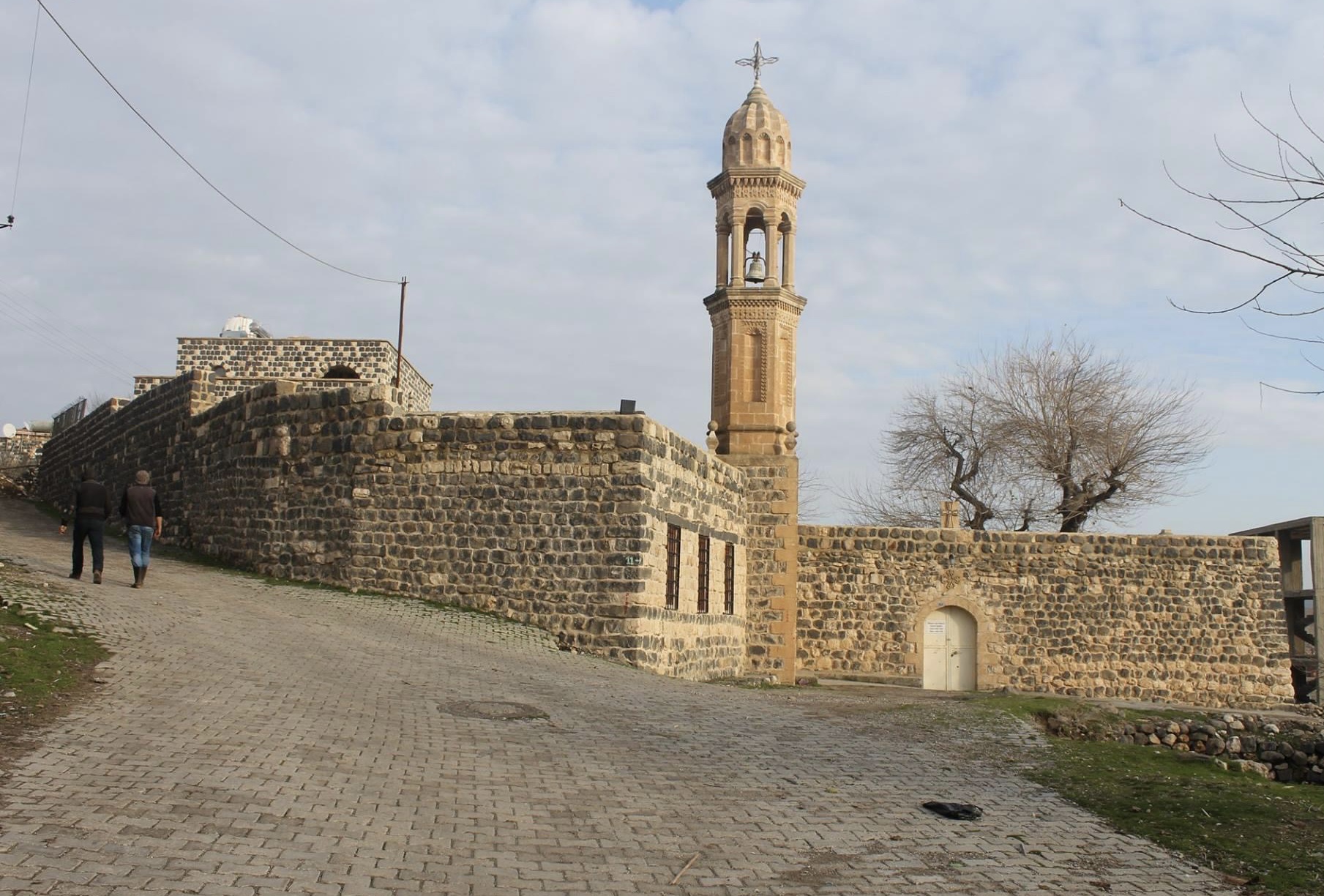|
MaДҹarakГ¶y, Д°dil
MaДҹarakГ¶y or MaДҹara (; ) is a village in the Д°dil District of the ЕһДұrnak Province in Turkey. The village is populated by Kurds of the Salihan tribe. History KД«vakh (today called MaДҹarakГ¶y) is identified with the town of Kibaki, which submitted to Ashurnasirpal II during his campaign against Nairi in 879 BC. Ashurnasirpal II spent one night encamped at Kibaki and received cattle, sheep, wine, and bronze cooking-pots in tribute. It was located in the KaЕЎiД“ri mountains. The Eastern Roman Emperor Anastasius I Dicorus () is said to have donated the village to the Mor Gabriel Monastery. At the beginning of the 20th century, it was a large village and was home to the Yazidi ГҮelkГ® tribe. When the Ottomans called upon them to join the army in 1910s, they refused. No school existed in the village. Yazidi Kurds from the village are said to have helped the Christians of Azekh amidst the Sayfo to fight Turkish Kurds. They also provided information, weapons, and transport to t ... [...More Info...] [...Related Items...] OR: [Wikipedia] [Google] [Baidu] |
Д°dil District
Д°dil District is a district of the ЕһДұrnak Province of Turkey. The seat of the district is the town of Д°dil and the population was 77,105 in 2021. Its area is 1,148 km2. The district was formed in 1937. The western part of the district is considered part of the Tur Abdin region, while the eastern part is considered part of the Bohtan region. Settlements Д°dil District contains three beldes, sixty-five villages, of which three are unpopulated, and nineteen hamlets A hamlet is a human settlement that is smaller than a town or village. This is often simply an informal description of a smaller settlement or possibly a subdivision or satellite entity to a larger settlement. Sometimes a hamlet is defined f .... Beldes # Д°dil # Karalar () # SДұrtkГ¶y () Villages # AГ§ma () # AkdaДҹ () # Akkoyunlu () # Aksoy () # AlakamДұЕҹ () # BaЕҹakkГ¶y () # Bereketli () # Bozburun () # BozkДұr () # ГҮДұДҹДұr () # ГҮДұnarlДұ () # ГҮukurlu () # Dirsekli ( ... [...More Info...] [...Related Items...] OR: [Wikipedia] [Google] [Baidu] |
Ottoman Empire
The Ottoman Empire (), also called the Turkish Empire, was an empire, imperial realm that controlled much of Southeast Europe, West Asia, and North Africa from the 14th to early 20th centuries; it also controlled parts of southeastern Central Europe, between the early 16th and early 18th centuries. The empire emerged from a Anatolian beyliks, ''beylik'', or principality, founded in northwestern Anatolia in by the Turkoman (ethnonym), Turkoman tribal leader Osman I. His successors Ottoman wars in Europe, conquered much of Anatolia and expanded into the Balkans by the mid-14th century, transforming their petty kingdom into a transcontinental empire. The Ottomans ended the Byzantine Empire with the Fall of Constantinople, conquest of Constantinople in 1453 by Mehmed II. With its capital at History of Istanbul#Ottoman Empire, Constantinople (modern-day Istanbul) and control over a significant portion of the Mediterranean Basin, the Ottoman Empire was at the centre of interacti ... [...More Info...] [...Related Items...] OR: [Wikipedia] [Google] [Baidu] |
Villages In Д°dil District
A village is a human settlement or community, larger than a hamlet but smaller than a town with a population typically ranging from a few hundred to a few thousand. Although villages are often located in rural areas, the term urban village is also applied to certain urban neighborhoods. Villages are normally permanent, with fixed dwellings; however, transient villages can occur. Further, the dwellings of a village are fairly close to one another, not scattered broadly over the landscape, as a dispersed settlement. In the past, villages were a usual form of community for societies that practice subsistence agriculture and also for some non-agricultural societies. In Great Britain, a hamlet earned the right to be called a village when it built a church.-4; we might wonder whether there's a point at which it's appropriate to talk of the beginnings of French, that is, when it wa ... ''village'', from Latin ''villДҒticus'', ultimately from Latin ''villa'' (English ''villa''). Ce ... [...More Info...] [...Related Items...] OR: [Wikipedia] [Google] [Baidu] |
Yazidi Communities In Turkey
Yazidis, also spelled Yezidis (; ), are a Kurdish-speaking endogamous religious group indigenous to Kurdistan, a geographical region in Western Asia that includes parts of Iraq, Syria, Turkey, and Iran. The majority of Yazidis remaining in the Middle East today live in Iraq, primarily in the governorates of Nineveh and Duhok. There is a disagreement among scholars and in Yazidi circles on whether the Yazidi people are a distinct ethnoreligious group or a religious sub-group of the Kurds, an Iranic ethnic group. Yazidism is the ethnic religion of the Yazidi people and is monotheistic in nature, having roots in a pre-Zoroastrian Iranic faith. Since the spread of Islam began with the early Muslim conquests of the 7thвҖ“8th centuries, Yazidis have faced persecution by Arabs and later by Turks, as they have commonly been charged with heresy by Muslim clerics for their religious practices. Despite various state-sanctions in the Ottoman Empire, Yazidis historically have li ... [...More Info...] [...Related Items...] OR: [Wikipedia] [Google] [Baidu] |
Turkish Statistical Institute
Turkish Statistical Institute (commonly known as TurkStat; or TГңД°K) is the Turkish government agency commissioned with producing official statistics on Turkey, its population, resources, economy, society, and culture. It was founded in 1926 and headquartered in Ankara. Formerly named as the State Institute of Statistics (Devlet Д°statistik EnstitГјsГј (DД°E)), the institute was renamed as the Turkish Statistical Institute on November 18, 2005. See also * List of Turkish provinces by life expectancy References External linksOfficial website of the institute National statistical services Statistical Statistics (from German language, German: ', "description of a State (polity), state, a country") is the discipline that concerns the collection, organization, analysis, interpretation, and presentation of data. In applying statistics to a s ... Organizations established in 1926 Organizations based in Ankara {{Sci-org-stub ... [...More Info...] [...Related Items...] OR: [Wikipedia] [Google] [Baidu] |
Gülgöze, Midyat
Inwardo or GГјlgГ¶ze () is a neighbourhood in the municipality and district of Midyat, Mardin Province, Turkey. GГјlgГ¶ze is populated by Assyrians/Syriacs and had a population of 245 in 2024. In the village is the Syriac Orthodox Church of Mor HadbЕҹabo, which is in the care of a sole nun. Additionally, the village is home to the Churches of Mor Barsaumo and Kundel. Etymology The Syriac name for the village translates to "eye of the rose". History The village of Iwardo is situated on top of three hills, and is considered one of the oldest Assyrian/Syriac villages in the Tur Abdin region. The Church of Mor Barsaumo is located on a hill parallel to Aynwardo, carved into a rock structure and built on an old settlement in the village. The Church of Kundel is located five kilometers northwest of the village and is believed to have been built between the 6th and 8th century, although its origins are unclear. Both are not believed to have been used as a church space in a long time ... [...More Info...] [...Related Items...] OR: [Wikipedia] [Google] [Baidu] |
Assyrian People
Assyrians (, ) are an ethnic group Indigenous peoples, indigenous to Mesopotamia, a geographical region in West Asia. Modern Assyrians Assyrian continuity, share descent directly from the ancient Assyrians, one of the key civilizations of Mesopotamia. While they are distinct from other Mesopotamian groups, such as the Babylonians, they share in the broader cultural heritage of the Mesopotamian region. Modern Assyrians may culturally self-identify as Terms for Syriac Christians#Syriac identity, Syriacs, Chaldean Catholics, Chaldeans, or Terms for Syriac Christians#Aramean identity, Arameans for religious, geographic, and tribal identification. Assyrians speak various dialects of Neo-Aramaic, specifically those known as Suret and Turoyo, which are among the oldest continuously spoken and written languages in the world. Aramaic was the lingua franca of West Asia for centuries and was the language spoken by historical Jesus, Jesus. It has influenced other languages such as Hebrew an ... [...More Info...] [...Related Items...] OR: [Wikipedia] [Google] [Baidu] |
Sayfo
The Sayfo (, ), also known as the Seyfo or the Assyrian genocide, was the mass murder and deportation of Assyrian people, Assyrian/Syriac Christians in southeastern Anatolia and Persia's Azerbaijan (Iran), Azerbaijan province by Ottoman Army (1861вҖ“1922), Ottoman forces and some Kurdish tribes during World War I. The Assyrians were divided into mutually antagonistic churches, including the Syriac Orthodox Church, the Assyrian Church of the East, and the Chaldean Catholic Church. Before World War I, they largely lived in mountainous and remote areas of the Ottoman Empire and Persia, some of which were effectively Stateless society, stateless. The Ottoman Empire's nineteenth-century centralization efforts led to increased violence and danger for the Assyrians. Mass killing of Assyrian civilians began during the Persian campaign (World War I), Ottoman occupation of Azerbaijan from January to May 1915, during which massacres were committed by Ottoman forces and pro-Ottoman Kur ... [...More Info...] [...Related Items...] OR: [Wikipedia] [Google] [Baidu] |
Д°dil
Д°dil (, or ''Beth Zabday'', , ) is a city and seat of the Д°dil District of the ЕһДұrnak Province in Turkey. It is located in the historical region of Tur Abdin. The town had a population of 30,271 in 2021 and is composed of Kurds of the Domanan, Dorikan, Harunan, Meman and Omerkan tribes. The town was once home to a large number of Assyrians/Syriacs, however, only a few families remain today. In the city, there is a Syriac Orthodox Church of the Mother of God (, ). History Azakh (today called Д°dil) is identified as the town of Ashikhu, or Asiбё«u, which is earliest attested in an administrative note from the governor's archive at Tell Halaf, during the reign of Adad-nirari III, King of Assyria, in the late 9th and early 8th century BC. Azakh was later conflated with the neighbouring city of Bezabde, and led to its alternative Syriac name Beth Zabday. Ottoman Empire Muhammad Pasha, Emir of Rawandiz, took advantage of the disruption caused to the Ottoman Empire by the E ... [...More Info...] [...Related Items...] OR: [Wikipedia] [Google] [Baidu] |
Yazidi
Yazidis, also spelled Yezidis (; ), are a Kurdish-speaking endogamous religious group indigenous to Kurdistan, a geographical region in Western Asia that includes parts of Iraq, Syria, Turkey, and Iran. The majority of Yazidis remaining in the Middle East today live in Iraq, primarily in the governorates of Nineveh and Duhok. There is a disagreement among scholars and in Yazidi circles on whether the Yazidi people are a distinct ethnoreligious group or a religious sub-group of the Kurds, an Iranic ethnic group. Yazidism is the ethnic religion of the Yazidi people and is monotheistic in nature, having roots in a pre-Zoroastrian Iranic faith. Since the spread of Islam began with the early Muslim conquests of the 7thвҖ“8th centuries, Yazidis have faced persecution by Arabs and later by Turks, as they have commonly been charged with heresy by Muslim clerics for their religious practices. Despite various state-sanctions in the Ottoman Empire, Yazidis historically have lived ... [...More Info...] [...Related Items...] OR: [Wikipedia] [Google] [Baidu] |
ЕһДұrnak Province
ЕһДұrnak Province (, ) is a Provinces of Turkey, province in Turkey in the Southeastern Anatolia Region. ЕһДұrnak Province was created in 1990, with areas that were formerly part of the Siirt Province, Siirt, HakkГўri Province, HakkГўri and Mardin Provinces. It borders both Kurdistan Region of Iraq and Syria. The current WДҒli, Governor of the province is Cevdet Atay. The province had a population of 570,745 in 2023. Its area is 7,078 km2. It encompasses 19 Belde, municipalities, 240 villages and 192 Hamlet (place), hamlets. Considered part of Turkish Kurdistan, the province has a Kurds, Kurdish majority. Geography ЕһДұrnak Province has some mountainous regions in the west and the south, but the majority of the province consists of plateaus, resulting from the many rivers that cross it. These include the Tigris (and its tributaries Hezil and KДұzДұlsu) and ГҮaДҹlayan (river), ГҮaДҹlayan. The most important mountains are Mount Cudi (2089 m), Mount Gabar, Mount Namaz and Moun ... [...More Info...] [...Related Items...] OR: [Wikipedia] [Google] [Baidu] |








